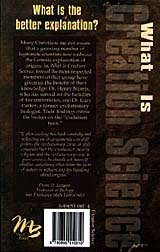What Is Creation Science?
Revised and Expanded!
(photo of back cover)Full Description | List of Illustrations
| Part I: | Evolution: Science or Faith |
| Chapter 1: | The Vanishing Case for Evolution Science |
Part II: |
The Life Science |
| 2: | Evidence of Creation in Living Systems |
| 3: | Darwin and the Nature of Biologic Change |
| 4: | The Fossil Evidence |
Part III: |
The Physical Sciences |
| 5: | Creation and the Laws of Science |
| 6: | Catastrophism in Geology |
| 7: | How and When Did the World Begin? |
Appendix A: |
Questions and Criticisms |
| B: | Literature Cited |
| C: | Index of Subjects |
| D: | Index of Names |
- Recognizing Evidence of Creation or Natural Processes
- DNA/Proteins
- Miller’s Spark Chamber
- DNA/R-Groups
- Living Cell
- Homology in Forelimbs
- Supposedly Vestigial Organs in Human Embryo
- Actual Function of Supposedly Vestigial Organs in Human Embryo
- Platypus
- Nature’s Challenges to Evolutionary Theory — Cleaner Fish
- Variatil2. Peppered Moths — Biston betularia
- “Difficulties With the Theory”
- “Darwin’s Finches”
- The Discarded Theory of Pangenes
- Mutations in Fruit Flies
- Mutations — A Genetic Burden
- Sickle Cell Mutation
- Variation Within Created Types
- Variation in Skin Color
- Recognizing Created Types
- Change and Variation
- Fossil Community of the Trilobite Seas
- Archaeopteryx
- “Pro-Avis”
- “Hopeful Monsters”
- Discarded Candidates for Human Ancestors
- Australopithecines
- Fossil Footprints
- Two Interprestations of Fossil Groups
- Polystrates
- Origin of Large Fossil Beds
- The Evolution Model
- The Creation Model
- Varied Applications of Entropy Concept
- Implications of Laws of Thermodynamics
- Increasing Entropy in Closed System
- Increasing Entropy in Open System
- Necessary Conditions
- Necessity of Program and Conversion Mechanism for Decrease in Entropy
- A. Criteria for Increasing Order
- B. Absence of Ordering Criteria in Evolution
- The Two Postulated Arrows of Time
- Standard Geologic Column and System of Geologic “Ages”
- Inadequacy of Stratigraphic Order to Determine Age
- Inadequacy of Lithology to Determine Age
- Inadequacy of Unconformities to Determine Age
- Circular Reasoning and Use of Fossils to Determine Age
- Limited Extent of Unconformities
- Changes in Cosmic Organization: Speculative vs. Scientific
- Complexity and Stability of the Cosmos
- Maximum Number of Possible Events
- Probability of Chance Origin of Life
- Impossibility of Naturalistic Origin of Life
- Uncertainties in Extrapolating Process Rates
- Natural System Changing With Time
- Calculation of Apparent Age of Changing System
- Necessary Assumption in Apparent Age Calculation

